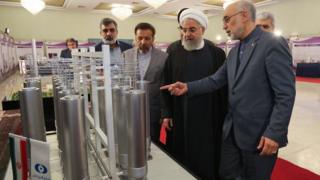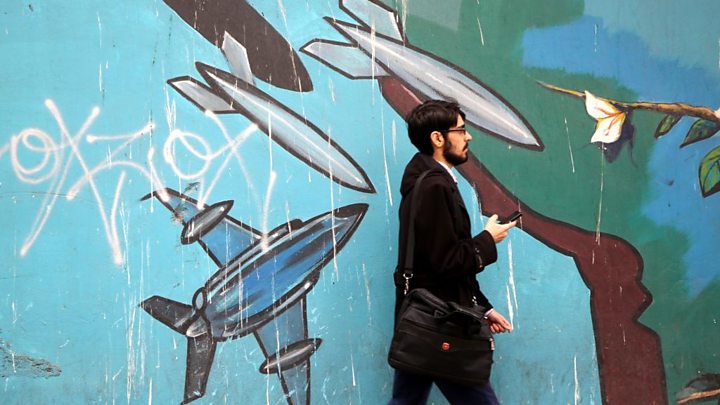 Image copyright
Image copyright
EPA
Iran said last month that it would quadruple its production of low-enriched uranium
The head of the global nuclear watchdog has confirmed Iran is increasing its production of enriched uranium.
But International Atomic Energy Agency (IAEA) chief Yukiya Amano said it was not clear when they will reach a limit set under a 2015 international deal.
Iran announced last month that it would suspend some commitments in retaliation for sanctions reinstated by the US.
Mr Amano also said he was worried about the current tensions over the Iranian nuclear issue and called for dialogue.
Iranian Foreign Minister Mohammad Javad Zarif later said reducing tensions was only possible by stopping what he called the “economic war by America”.
“Those who wage such wars cannot expect to remain safe,” he told a news conference during a visit to Tehran by his German counterpart, Heiko Maas.
Mr Maas warned that the situation in the region was “highly explosive and extremely serious” and could lead to a military escalation between the US and Iran.
How have tensions risen?
US President Donald Trump abandoned the nuclear deal last year and reinstated sanctions that had been lifted in return for Iran limiting its nuclear activities.
Then last month, he ended exemptions from US secondary sanctions for countries that continued buying oil from Iran. This decision was intended to bring Iranian oil exports to zero, denying their government its main source of revenue.

Media playback is unsupported on your device
Days later, Iranian President Hassan Rouhani said his country was rolling back some restrictions under the deal. This included no longer complying with caps on its stockpiles of enriched uranium and heavy water – set at 300kg and 130 tonnes respectively – and halting sales of surplus supplies overseas.
Enriched uranium is used to make reactor fuel but also nuclear weapons, while spent fuel from a heavy-water reactor contains plutonium that would be suitable for a bomb.
Mr Rouhani also gave the other five states still party to the nuclear deal – Germany, the UK, France, China and Russia – until 7 July to protect Iranian oil sales from US sanctions. Otherwise Iran will suspend its restrictions on the purity of enriched uranium.
At the same time, the White House sent an aircraft carrier strike group, B-52 bombers, and a Patriot missile defence battery to the Gulf because of “troubling and escalatory indications” related to Iran.
Image copyright
EPA
The US has deployed B-52 bombers and a carrier strike group to the region
Iran was subsequently accused by the US of being behind attacks on four oil tankers off the coast of the United Arab Emirates; two oil pumping stations in Saudi Arabia; and the Green Zone in the Iraqi capital Baghdad, where many foreign embassies are located. Iran denied the allegations.
Then, on 20 May, the Atomic Energy Organization of Iran announced that it would quadruple its production of low-enriched uranium and had informed the IAEA, which is tasked with monitoring Iranian compliance with the nuclear deal.
What have the IAEA said?
On Monday, the nuclear watchdog’s chief confirmed that Iran had increased its production rate. But Mr Amano declined to specify by how much and said it was not clear when the stockpile limit would be exceeded.
He told the IAEA’s Board of Governors it was essential that Iran fully implemented its commitments under the nuclear deal.
Image copyright
AFP
IAEA chief Yukiya Amano said he was worried about the tensions over the Iranian nuclear issue
“As I have constantly emphasised, the nuclear-related commitments entered into by Iran under the [deal] represent a significant gain for nuclear verification,” he said. “I therefore hope that ways can be found to reduce current tensions through dialogue.”
Germany’s Foreign Minister stressed that European powers wanted to fulfil their obligations under the deal and were attempting to provide Iran with alternative ways to trade.
“We cannot work miracles, but we will try to avert a failure,” Mr Maas said.
The Europeans have set up a “special purpose vehicle” that would essentially allow goods to be bartered between Iranian and foreign companies without direct financial transactions. But the mechanism – known as Instex – is not yet operational.
